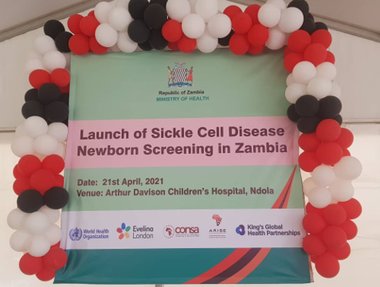2 June 2021
With the support of King’s Zambia Partnership, a new screening programme has launched in north east Zambia to enable early diagnosis and intervention for newborns with sickle cell disease.
In Zambia, sickle cell disease has been recognised as a public health problem by the Zambian Ministry of Health, with the sickle cell trait carried by 20-25% of the population and 1-2% of babies born with the disease.
Across the University Teaching Hospitals’ and Arthur Davison Children’s haematology clinic in north west Zambia, there are more than 16,000 active sickle cell patients on record, the majority of whom are children below the age of 15 years. Sickle cell anaemia adds to this burden, accounting for more than 10% of the total admissions to the Arthur Davison Children’s Hospital.
Through collaboration with the King’s Zambia Partnership, the provision of equipment by African Research and Innovative Initiative for Sickle Cell Education (ARISE), a project led by Baba Inusa, Evelina London and Arthur Davidson’s Teaching Hospital, a screening programme for newborns has been established. The hospital has installed an isoelectric focusing machine in its Tropical Diseases Research Centre. This machine will be used for newborn screening for sickle cell disease, enabling early identification.
This marks an important milestone for those living or caring for someone with sickle cell disease in Zambia. It is a vital step towards active management of the disease, ensuring intervention can begin as early as possible, resulting in improved health outcomes.
To address this significant burden of sickle cell disease on families across the country, the National Health Strategic Plan has pledged to halt and reduce non-communicable diseases in Zambia and the King’s Zambia Partnership is helping turn this pledge into action.
The King’s Zambia partnership builds on a 10-year relationship between Guy’s and St Thomas’ NHS Foundation Trust, the Ndola Teaching Hospital and the Arthur Davison Children’s Hospital. The partnership is committed to improving access to and quality of care at these hospitals and beyond.
Dr Jonas Kamima Chanda, Minister of Health in Zambia, said:
This event marks an important milestone to us in the health sector, as well as those living or caring for someone with sickle cell disease.
I am confident that with this (screening programme) in place now, we will be in an even better position to monitor and follow up our patients from a tender age for better management outcomes.
You can find out more about King’s Global Health Partnerships here.
Liked this article? See how King’s Global Health Partnerships’ is supporting the fight against malaria in Sierra Leone.





